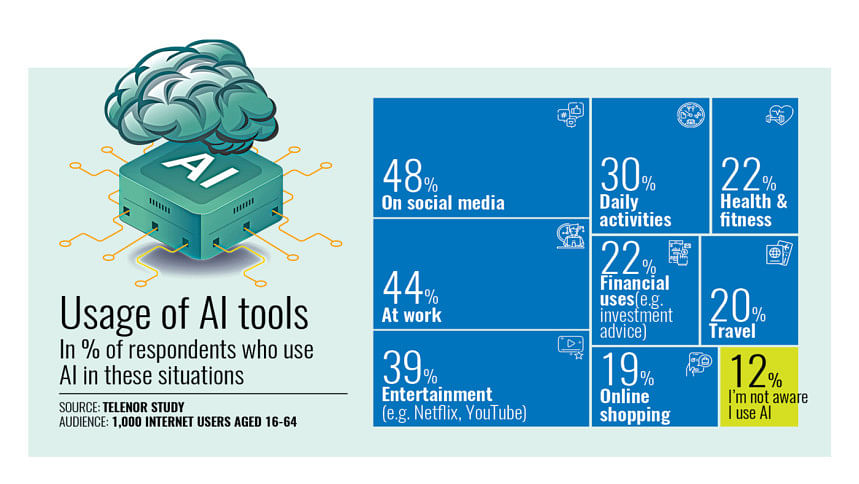90% people use AI in some form, 44% at work

A significant majority of Bangladeshi internet users are already integrating artificial intelligence (AI) into their everyday lives, according to a new study by Telenor Asia.
The report, titled "Digital Lives Decoded: Bangladesh", reveals that about 90 percent of respondents claim to use AI in some way or form, demonstrating how swiftly the technology has penetrated daily life in the country.
The study, which surveyed 1,000 digitally connected individuals aged 16-64 across Bangladesh, shows that AI adoption is being driven largely by mobile usage.
Social media is the top use case (48 percent) for AI tools, but mobile internet users in Bangladesh are more likely to use AI at work and in their daily activities than those in Singapore, Malaysia or Thailand.
Around 44 percent of respondents use AI at work, 39 percent for entertainment, 30 percent in daily activities, 22 percent for financial purposes, 19 percent for online shopping, 22 percent for health and fitness, and 20 percent for travel.
This trend is driven more by millennials than Gen Z. More than half of millennials use AI for social media or at work, and over a quarter for finance and fitness.
Perceptions of AI's future impact are generally positive, both at the individual and societal levels. Education and arts are seen as key beneficiaries, but nearly two-thirds believe in the positive impact of AI on the country's economy and their job security.
About 8 in 10 respondents believed that AI would positively impact education, surpassing anticipated benefits in other areas such as transportation, the economy and consumer health.
This remains relatively consistent across demographics, signalling the potential for AI to play a pivotal role in revolutionising education, making it more accessible and adaptable to different learning needs.
AI in the workplace
Survey respondents in Bangladesh report themselves to be more avid users of AI in the workplace than Singapore, Malaysia or Thailand.
This is driven primarily by millennial workers and men: almost half of male mobile internet users have used AI at work, compared to just over a third of women (37 percent).
Those who use AI at work are also more likely to trust AI-generated information a lot/completely: especially when it comes to AI chatbots/virtual assistants (56 percent), threat detection (47 percent) and predictive analysis (45 percent).
The study said this could be the result of digital transformation happening in Bangladesh, but without the same level of regulations as seen in markets like Singapore and Malaysia.
AI tools are clearly popular in the workforce in Bangladesh, but greater education is needed around the trustworthiness and limitations of AI-generated information.
As AI-integrated mobile phones usher in a new era of user experience, automating tasks and enhancing personalisation, an increasing amount of data from the user will be harvested.
Those who use AI at work are especially attuned to concerns around the use of AI for data handling. They are more likely to worry about a lack of transparency in how data is used and shared (+31 percent), extensive data collection without clear consent (+21 percent) and unauthorised access to sensitive information (+21 percent).
As the use of AI continues to grow in Bangladesh, especially in the workplace, training and developing best practices for employing AI in data handling should be a priority.
For older generations, even more concerning is the reduced critical thinking skills and over-reliance on AI for daily tasks.
On the whole, mobile internet users in Bangladesh are more likely than those in Singapore and Malaysia to worry about reduced problem-solving skills.
The study found mobiles are enabling people in Bangladesh to live a smarter life, helping them gain new skills, improve social connectivity, and increase their personal sense of safety.
As the digital landscape evolves in Bangladesh, concerns around new threats of identity theft and deepfakes have emerged.
About 7 in 10 mobile internet users expressed worries about the security of their online accounts. Bangladesh also stands out for heightened concerns about network attacks: 3 in 10 say this is a top concern, versus just 1 in 5 in Singapore and Thailand, and even fewer in Malaysia.

 For all latest news, follow The Daily Star's Google News channel.
For all latest news, follow The Daily Star's Google News channel. 



Comments